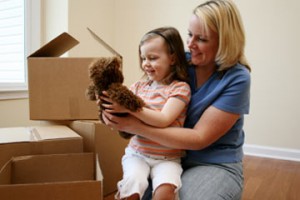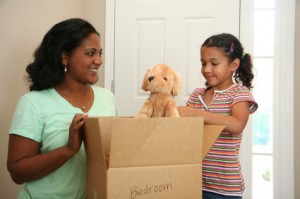 Whether you’re moving across town or across the country, moving can be a stressful and angst-ridden process. However, as difficult as it may be for adults, moving can be even more traumatic for children. Discussing the move and the motivations for it can help them cope. Try to give them as much information about it as possible, answer questions as completely and honestly as you can, and be receptive to your children’s feelings.
Whether you’re moving across town or across the country, moving can be a stressful and angst-ridden process. However, as difficult as it may be for adults, moving can be even more traumatic for children. Discussing the move and the motivations for it can help them cope. Try to give them as much information about it as possible, answer questions as completely and honestly as you can, and be receptive to your children’s feelings.
 If you’re moving nearby, taking your children to visit their new home can help alleviate some of the anxiety they face. While this strategy won’t work for distant moves, you can still provide your children with as much information as possible about their new home by accessing the Internet.
If you’re moving nearby, taking your children to visit their new home can help alleviate some of the anxiety they face. While this strategy won’t work for distant moves, you can still provide your children with as much information as possible about their new home by accessing the Internet.
When planning a move with young children, timing is everything. For instance, if your family has recently dealt with a major life change, such as a divorce or death, you may want to postpone a move to give your children time to adjust and cope. If you can, take school schedules into consideration. However, the decision of when to move may be out of your hands, perhaps due to a job change or financial reasons. Regardless, maintaining a positive attitude is key, as parents’ attitudes can affect children looking for reassurance.
 Once the actual moving process begins, let your children be a part of it by letting them pack their personal belongings, sort toys and other items, or wrap objects in bubble wrap. Prior to moving day, prepare a goodbye party so that your children have an opportunity to bid a fond farewell to the people and things that matter most to them. This can help give them closure, and turn the move into a more positive and exciting experience.
Once the actual moving process begins, let your children be a part of it by letting them pack their personal belongings, sort toys and other items, or wrap objects in bubble wrap. Prior to moving day, prepare a goodbye party so that your children have an opportunity to bid a fond farewell to the people and things that matter most to them. This can help give them closure, and turn the move into a more positive and exciting experience.
To make the move less stressful for yourself and your children alike, give yourself plenty of time to pack and plan ahead, as accomplishing any task quickly can be difficult with children underfoot. If babysitters are available, use them, as this will help you get necessary tasks done more quickly. If childcare is not available, finding activities to keep children occupied while you pack can be paramount.
 When packing, be sure to aside a bag of favorite children’s toys and activities that will stay with you while traveling. This will enable your children to have something to do on the way to their new home. By that same token, keep extra clothes on hand during your move, and pack a cooler full of healthy snacks to help alleviate hunger and boredom on the moving journey.
When packing, be sure to aside a bag of favorite children’s toys and activities that will stay with you while traveling. This will enable your children to have something to do on the way to their new home. By that same token, keep extra clothes on hand during your move, and pack a cooler full of healthy snacks to help alleviate hunger and boredom on the moving journey.
Speaking of toys, be sure to label boxes of your children’s toys and other possessions very clearly, with as much detail as possible. The first few days of unpacking and settling into a new place can be chaotic, so knowing exactly where your children’s possessions are will make it much easier to retrieve them when needed. When you get to your new home, maintaining familiar routines can help comfort your children and ease their transition, as can unpacking familiar items first. Seeing familiar possessions can help make a new house feel like home for both you and your children.
Regardless of how stressful a move may be for children, if you take the time to prepare them for what to expect, the chances are good that they’ll get through it just fine.





